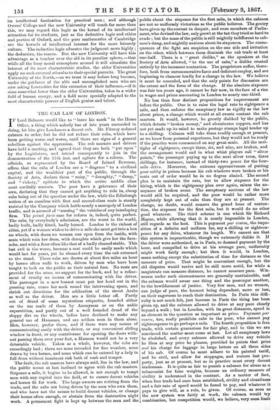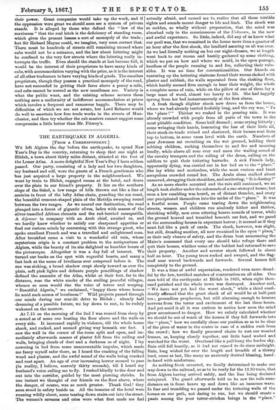THE CAB LAW OF LONDON.
IF Lord Belmore would like to "leave his mark" in the Home Office, a thing which nobody has of late years succeeded in doing, let him give Londoners a decent cab. Mr. Fitzroy reduced cabmen to order, but he did not reduce their cabs, which have been getting worse and worse, until there are signs of a general rebellion against the oppression. The cab masters and drivers have held a meeting, and agreed that they are both "put upon" -by the Legislature, and intend consequently to join in the demonstration of the 11th inst. and agitate for a reform. The officials, as represented by the Board of Inland Revenue, affirm that the cabs of London are a " disgrace " to a civilized capital, and the wealthier part of the public, through the Society of Arts, declare them "noisy," "draughty," "damp," and "rickety," epithets in which the entire middle class most cordially concurs. The poor have a grievance of their own, declaring that they cannot get anything to ride in, cheap cabs being out of the question under the law, while the Edinburgh notion of an omnibus with first and second-class seats is stoutly resisted by the Company which holds nearly a monopoly of London traffic, and is accused of "nursing" the vehicles of any interloping firm. The prima facie case for reform is, indeed, quite perfect. The cabs, by everybody's admission, are the worst in the world, badly built, badly fitted, badly horsed. London is the richest of cities, yet if a woman wishes to drive a mile she must get into a box on wheels, with doors no woman can open from the inside, with seats which ruin her dress, with draughts which give her the face- ache, and with a floor often like that of a badly cleaned stable. 'This last evil is the worse, because a mat could be easily made which would last for years, yet be cleaned every time the cab returned to the stand. These cabs are drawn at about five miles an hour by horses often unfit to work, driven by men who have been taught to look on the public as their natural foes. No rests are provided for the arms, no support for the back, and by a refine- ment of cruelty no means of communicating with the driver. The passenger in a new bonnet must put her head out in the pouring rain, crane her neck round the intervening space, and shriek out directions for the edification of the street Arabs as well as the driver. Men are a little better off. Partly out of dread of some mysterious etiquette, founded either on the use made of them by Anonymas or on the ankle superstition, and partly out of a well founded dread of the sloppy dirt on the wheels, ladies have declined to make any general use of Hansoms, and are seldom seen in them alone. Men, however, prefer them, and if there were any means of communicating easily with the driver, or any convenient sliding window in front, or any contrivance for opening the doors with- out passing them over your feet, a Hansom would not be a very detestable vehicle. Taken as a whole, however, the cabs are exceedingly bad ; there are none intended for fine weather, none drawn by two horses, and none which can be entered by a lady in full dress without imminent risk both of cash and temper.
The fault, the cab masters have always said, lies in the law, and the public seems at last inclined to agree with the cab masters. Sixpence a mile, it begins to be allowed, is not enough to tempt men with any capital into the field, or to ensure decent vehicles and horses fit for work. The large owners are retiring from the trade, and the cabs are being driven by the men who own them, and who have not the means to build decent vehicles, or change their horses often enough, or abstain from the destructive night work. A permanent fight is kept up between the men and the public about the sixpence for the first mile, in which the cabmen are not so uniformly victorious as the public believes. The gentry have given up the contest in despair, and even members of Parlia- ment, who devised the law, only growl at the tax theytried so hard to evade ; but the mass of the public is still mightily indifferent to cab- men's slang, and mightily anxious about its sixpences. The conse- quences of the fight are suspicion on the one aide and irritation on the other, which between them diminish the cab trade at least one-half. There is a "great dislike," as the speakers at the Society of Arts allowed, "to the use of cabs," a dislike created entirely by the incessant contention. The proprietors suffer, there- fore, both from unreinunerative fares and deficient employ, and are beginning to clamour loudly for a change in the law. We believe it must be conceded, and that the only points for discussion are the extent and the form of the change. If the absolute sixpence was fair ten years ago, it cannot be fair now, in the face of a rise in wages and prices amounting in London to nearly one-third.
No lees than four distinct propositions for improvement are before the public. One is to raise the legal rate to eightpence a mile, and then enforce the sumptuary law as rigidly as the law about prices, a change which would at all events content the cab masters. It would, however, be greatly disliked by the public, which detests "broken money," and abominates coppers, and has not yet made up its mind to make postage stamps legal tender up to a shilling. Cabmen will take them readily enough at present, as we know from personal experience, but they would not be ready if the practice were commenced on any great scale. All the mul- tiples of eightpence, except three, six, and nine, are broken, and the arrangement would end in what whist players call "silver points," the passenger paying up to the next silver term, three shillings, for instance, instead of thirty-two pence for the four- mile drive. Moreover, the extreme oppressiveness of putting poor cabby in prison because his cab windows were broken or his seats out of order would be in no degree abated. The second plan is to maintain the rate, but to allow sixpence for the hiring, which is the eightpenny plan over again, mime; the an- noyance of broken sums. The sumptuary sections of the law would still be required, and the poor would be rather more completely kept out of cabs than they are at present. The change, no doubt, would remove the grand bone of conten- tion, the sixpence for the first mile, but it would do no other good whatever. The third scheme is one which Sir Richard Mayne, while allowing that it is nearly impossible in London, still regards as the best. This is payment par course, the impo- aition of a definite and uniform fee, say a shilling or eighteen- pence for any drive, whatever its length. We cannot see that this system is impracticable, though we extremely dislike it. If the driver were authorized, as in Paris, to demand payment by the hour, and compelled to drive at his average pace, uniformity might work fairly enough ; but then it would, in London, mean nothing except the substitution of time for distance as the measure of price. That might be convenient enough, but the old disputes would revive and be still more acrid, for while a magistrate can measure distance, he cannot measure pace. Wit- nesses under such circumstances are generally unattainable, and the cabman would swear one thing and the passenger another, to the bewilderment of justice. Very few men, and no women, can judge of pace, the keenest being dependent, more or less, on their eagerness to reach their destination. In Paris this diffi- culty is not much felt, just because in Paris the thing has been given up, and the cabman allowed to drive at any pace clearly beyond a walk ; but in London, with its great distances, speed is an element in the question as important as price. Payment par course, too, really prohibits cabs to the poor, who cannot pay eighteenpence to go perhaps a mile. The fourth proposition is free trade, with certain guarantees for fair play, and to this we are convinced the matter must come at last. Let all sumptuary laws be abolished, and every cabman allowed to drive any vehicle he likes at any price he pleases, provided he paints that price and his charge for luggage in large letters on all three sides of his cab. Of course he must adhere to his painted tariff, and be civil, and allow for stoppages, and restore lost pro- perty, just as at present, but so in practice must every decent tradesman. It is quite as fair to punish a cabman for abuse as a tobacconist for false weights, because an ordinary measure of civility is understood in the contract. As a matter of fact, when free trade had once been established, civility and cleanliness and a fair rate of speed would be found to pay, and whatever it pays to give will, as a rule, be given. Of course, as soon as the new system was fairly at work, the cabmen would try combination, but competition would, we believe, very soon limit their power. Great companies would take up the work, and if the oppression were great we should soon see a system of private stands: It is alleged by those who defend the "law of the maximum " that the real hitch is the deficiency of standing room, which gives the present lessees a sort of monopoly of the trade ; but Sir Richard Mayne could, we imagine, very soon correct that. 'There must be hundreds of streets still remaining unused where cabs would not be a nuisance, and the law about loitering might be confined to the very few streets where the loitering really in- terrupts the traffic. Even should the stands at last become full, it would be the interest of their proprietors to have many kinds of cabs, with accommodation varying with the price, as it is the interest -of all other tradesmen to have varying kinds of goods. The omnibus proprietors, though they possess a practical monopoly of the road, have not succeeded in getting their fares above a penny a mile, and cabs cannot be nursed as the new omnibuses are. Variety is what the public want, and the existing scheme secures them nothing save a uniformity of indifferent accommodation at prices which involve a frequent and rancorous haggle. There may be -difficulties of which we are not aware, but Lord Belmore would -do well to ascertain how free trade works in the streets of Man- chester, and then try whether the cab masters cannot suggest some compromise a little better than Mr. Fitzroy's.































 Previous page
Previous page